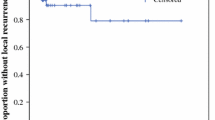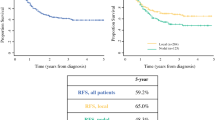Abstract
Objectives
We aimed to define the impact of patient, tumor, surgical, and radiotherapy (RT) treatment parameters on Merkel cell carcinoma (MCC) recurrence and survival.
Methods
The study was a retrospective review of 45 patients with primary disease evaluated between 1981 and 2012 at a single U.S. institution and treated with curative intent.
Results
The American Joint Committee on Cancer (AJCC) stage was I in 42.2 %, II in 8.9 %, III in 26.7 %, and unknown in 22.2 %. 95.6 % underwent primary lesion excision and 69.8 % received adjuvant RT to the tumor bed. Regional management included sentinel lymph node biopsy (35.6 %) and lymph node dissection (28.9 %) with adjuvant RT in 11.1 % and 13.3 %, respectively. 24 patients recurred, mostly at locoregional (LR) (50.0 %) and distant (41.7 %) sites. Only one in-field recurrence occurred after primary site RT. In univariate analysis, RT was associated with reduced (p = 0.003) and head and neck tumors with increased (p = 0.01) risk of LR recurrence. Higher AJCC and nodal stage patients were more likely to receive nodal dissection (p < 0.01) and had a decreased risk of LR recurrence (p < 0.05), but had a median survival time that was nearly half that of lower stage patients. No tested RT parameter was associated with outcomes.
Conclusions
Our study supports the efficacy of RT in improving LR control in MCC compared to excision alone and emphasizes the importance of surgical nodal evaluation.

Similar content being viewed by others
References
Hodgson NC (2005) Merkel cell carcinoma: changing incidence trends. J Surg Oncol 89(1):1–4. doi:10.1002/jso.20167
Prieto Munoz I, Pardo Masferrer J, Olivera Vegas J, Medina Montalvo MS, et al. (2013) Merkel cell carcinoma from 2008 to 2012: reaching a new level of understanding. Cancer Treat Rev 39(5):421–429. doi:10.1016/j.ctrv.2012.12.009
Koljonen V, Kukko H, Pukkala E, Sankila R, et al. (2009) Chronic lymphocytic leukaemia patients have a high risk of Merkel-cell polyomavirus DNA-positive Merkel-cell carcinoma. Br J Cancer 101(8):1444–1447. doi:10.1038/sj.bjc.6605306
Lanoy E, Engels EA (2010) Skin cancers associated with autoimmune conditions among elderly adults. Br J Cancer 103(1):112–114. doi:10.1038/sj.bjc.6605733
Heath M, Jaimes N, Lemos B, Mostaghimi A, et al. (2008) Clinical characteristics of Merkel cell carcinoma at diagnosis in 195 patients: the AEIOU features. J Am Acad Dermatol 58(3):375–381. doi:10.1016/j.jaad.2007.11.020
Bichakjian C, Olencki T, et al. (2014) Merkel Cell Carcinoma, Version 1.2014. J Natl Compr Cancer Netw 12:410–424
Jouary T, Leyral C, Dreno B, Doussau A, et al. (2012) Adjuvant prophylactic regional radiotherapy versus observation in stage I Merkel cell carcinoma: a multicentric prospective randomized study. Annals of oncology: official journal of the European Society for Medical Oncology/ESMO 23(4):1074–1080. doi:10.1093/annonc/mdr318
Foote M, Harvey J, Porceddu S, Dickie G, et al. (2010) Effect of radiotherapy dose and volume on relapse in Merkel cell cancer of the skin. Int J Radiat Oncol Biol Phys 77(3):677–684. doi:10.1016/j.ijrobp.2009.05.067
Lewis KG, Weinstock MA, Weaver AL, Otley CC (2006) Adjuvant local irradiation for Merkel cell carcinoma. Arch Dermatol 142(6):693–700. doi:10.1001/archderm.142.6.693
Chen MM, Roman SA, Sosa JA, Judson BL (2015) The role of adjuvant therapy in the management of head and neck Merkel cell carcinoma: an analysis of 4815 patients. JAMA Otolaryngol Head Neck Surg 141(2):137–141. doi:10.1001/jamaoto.2014.3052
Hasan S, Liu L, Triplet J, Li Z, et al. (2013) The role of postoperative radiation and chemoradiation in merkel cell carcinoma: a systematic review of the literature. Frontiers in oncology 3:276. doi:10.3389/fonc.2013.00276
National Cancer Institute (U.S.). (2014) Common terminology criteria for adverse events (CTCAE), Rev. ed. U.S. Dept. of Health and Human Services, National Institutes of Health, National Cancer Institute 9:7473
Cox JD, Stetz J, Pajak TF (1995) Toxicity criteria of the Radiation Therapy Oncology Group (RTOG) and the European Organization for Research and Treatment of Cancer (EORTC). Int J Radiat Oncol Biol Phys 31(5):1341–1346. doi:10.1016/0360-3016(95)00060-C
Peduzzi P, Concato J, Feinstein AR, Holford TR (1995) Importance of events per independent variable in proportional hazards regression analysis. II Accuracy and precision of regression estimates Journal of clinical epidemiology 48(12):1503–1510
Kachare SD, Wong JH, Vohra NA, Zervos EE, et al. (2014) Sentinel lymph node biopsy is associated with improved survival in Merkel cell carcinoma. Ann Surg Oncol 21(5):1624–1630. doi:10.1245/s10434-013-3434-3
Mehrany K, Otley CC, Weenig RH, Phillips PK, et al. (2002) A meta-analysis of the prognostic significance of sentinel lymph node status in Merkel cell carcinoma. Dermatologic surgery: official publication for American Society for Dermatologic Surgery [et al] 28(2):113–117 discussion 117
Kokoska ER, Kokoska MS, Collins BT, Stapleton DR, et al. (1997) Early aggressive treatment for Merkel cell carcinoma improves outcome. Am J Surg 174(6):688–693
Fields RC, Busam KJ, Chou JF, Panageas KS, et al. (2012) Recurrence after complete resection and selective use of adjuvant therapy for stage I through III Merkel cell carcinoma. Cancer 118(13):3311–3320. doi:10.1002/cncr.26626
Lemos BD, Storer BE, Iyer JG, Phillips JL, et al. (2010) Pathologic nodal evaluation improves prognostic accuracy in Merkel cell carcinoma: analysis of 5823 cases as the basis of the first consensus staging system. J Am Acad Dermatol 63(5):751–761. doi:10.1016/j.jaad.2010.02.056
Tseng J, Dhungel B, Mills JK, Diggs BS, et al. (2015) Merkel cell carcinoma: what makes a difference? Am J Surg 209(2):342–346. doi:10.1016/j.amjsurg.2014.06.013
Rao P, Balzer BL, Lemos BD, Liegeois NJ, et al. (2010) Protocol for the examination of specimens from patients with Merkel cell carcinoma of the skin. Archives of pathology & laboratory medicine 134(3):341–344. doi:10.1043/1543-2165-134.3.341
Zager JS, Messina JL, Glass LF, Sondak VK (2014) Unanswered questions in the management of stage I–III Merkel cell carcinoma. Journal of the National Comprehensive Cancer Network: JNCCN 12(3):425–431 quiz 431
Moshiri AS, Nghiem P (2014) Milestones in the staging, classification, and biology of Merkel cell carcinoma. Journal of the National Comprehensive Cancer Network: JNCCN 12(9):1255–1262
Pembrolizumab in Treating Patients With Advanced Merkel Cell Cancer (2016) Bethesda (MD): National Library of Medicine (US). https://clinicaltrials.gov/show/NCT02267603
Patnaik A, Kang SP, Rasco D, Papadopoulos KP, et al. (2015) Phase I study of pembrolizumab (MK-3475; anti-PD-1 monoclonal antibody) in patients with advanced solid tumors. Clinical cancer research: an official journal of the American Association for Cancer Research. doi:10.1158/1078-0432.CCR-14-2607
Acknowledgments
We would like to thank the Stanford School of Medicine Medical Scholars Research Program for the support of this project.
Author information
Authors and Affiliations
Corresponding author
Ethics declarations
Conflict of interest
The authors declare that they have no conflict of interest.
Statement of ethical standards
Institutional Review Board approval was obtained and HIPAA compliance was followed for a retrospective review of hospital, radiation therapy, and surgical pathology records. This article does not contain any studies with human or animal subjects performed by any of the authors.
Funding source(s)
This study was funded in part by the Stanford School of Medicine Medical Scholars Research Program.
Rights and permissions
About this article
Cite this article
Fu, M.A., Osmundson, E.C., von Eyben, R. et al. Merkel cell carcinoma: demographic, clinical, and treatment parameters of prognostic significance. J Radiat Oncol 5, 205–212 (2016). https://doi.org/10.1007/s13566-016-0255-6
Received:
Accepted:
Published:
Issue Date:
DOI: https://doi.org/10.1007/s13566-016-0255-6




